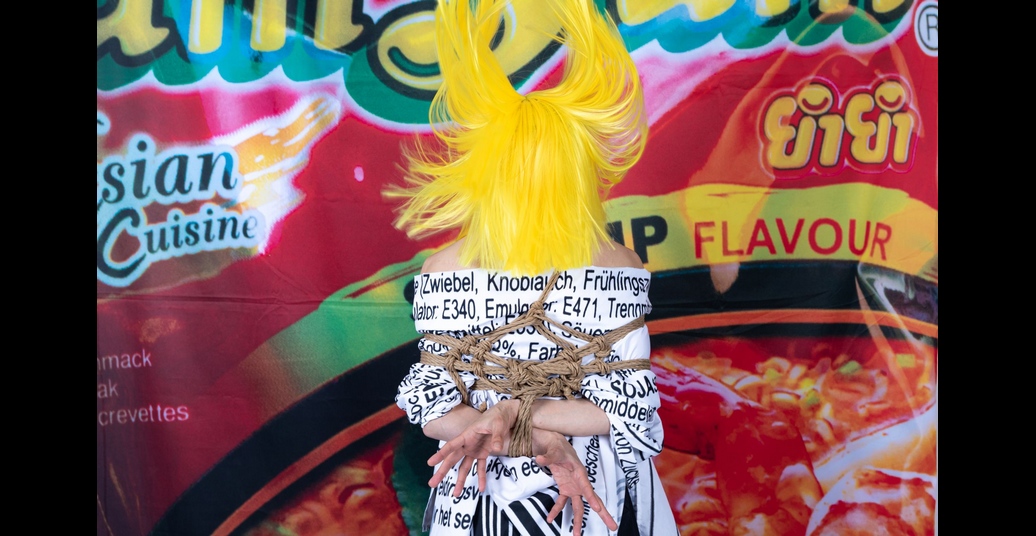The ensemble piece “Yum Yum” by Haus Sommer, led by choreographer and dancer Dasniya Sommer, playing from 12-14 May 2023 in Ballhaus Ost, confounds the supposedly unrelated while unraveling the possibilities of artificiality.
It starts with an unexpected realization: I have never eaten YumYum noodles. As I stand in the line waiting to be admitted for the premiere of this piece named for the popular instant meal, I reflect fruitlessly on the unknowability of the obvious. It won’t be the last time this evening that something remains impenetrable for me. Inside, in front of the audience seating area, a big, comfortable rug awaits us, literally unraveling into a whimsical scenic installation: from the ceiling, at a variety of heights, hang several transparent plastic bags half-filled with water; on the white curtained walls lean a few long wooden sticks; upstage, a huge rope knot hangs that (considering the performance’s title) immediately reminds me of noodles; and to the front at the border of the stage, also on a pile of rope bundles, there is a big wok (scenic design: Dasniya Sommer). In a corner at the stage’s edge that’s barely visible from where I am sitting, one of the performers is being casually tied up and prepared for suspension by three others, while another performer walks about among the bags of water sunk in thought, mouthing words that are probably a list of ingredients. Every time that something seems to become clearer to me, something else becomes opaque at the same time.
In the five-person intersectional ensemble of “Yum Yum”, which along with Sommer includes Michael Schumacher, Yui Kawaguchi, Tara Jade Samaya, and Fungi Fung, different artistic practices meet: theatre, ballet, mixed martial arts, contemporary dance, and the Japanese bondage art, Shibari. This already lays the foundation for an aesthetic of the eclectic that repeatedly questions common opposites and thereby generates unexpected connections. In a scene that is both poetic and brutal, Sommer, Kawaguchi, and Samaya dance a series of ballet steps—with, however, certain body parts tied up: their knees, their arms in front of their breasts, their hands behind their backs. This can be read as a critique of the way ballet disciplines bodies, but also as the sensuality of restriction. In another moment, Sommer and Kawaguchi (both of whom I read as Asian) appear together as Nintendo Marios with tutus made of shopping bags and dance a balletic choreography to Game Boy music, with more effort than light-footedness (sound design, composition: Nguyễn + Transitory). In doing so, they on the one hand undermine perfection expectations placed on both ballet and Asian bodies, and at the same time absurdly expose the enormously artificial style on which ballet is based, which it usually tries to hide under the hard-won appearance of effortless naturalness. While Schumacher sets about preparing a real noodle soup in the wok, I’m delighted by the outrageous offer to think about ballet as YumYum soup.
Beneath the patchwork of YumYum posters scattered all around and the different scenes of the performance, the theme of anti-Asian racism flashes up repeatedly. It expresses itself quite unapologetically in a polyvocal choir of different marginalized lived realities. A recording plays as the performers leave the stage: stories about cooking and eating merge with stories about work and migration. But the theme is also inherent in the exploration of the aesthetic and perhaps political possibilities of artificiality that runs like a thread through “Yum Yum”. Literary scholar Anne Anlin Cheng, who researches the long history of the aestheticization of the female Asian body, describes the potential of artificiality in, for example, fashion as “temporary relief from the burdens of having bodies and their inevitable weighty visibility” in particular for racialized people. Artificiality can be a site of protection as much as it can a locus of violence, as the piece repeatedly shows. At the end, all the countless items on the stage are tied together into a huge sack and the performers disappear under voluminous wigs and long capes. To ghostly music in twilight, time stands still, and all differences evaporate to form a soup that is, for me, indefinable: full of surprising aesthetic flavors. And so all that I didn’t understand comes together at the end into a humbling realization for me: my lack of knowledge when it comes to the everyday lives of the Asian diaspora around me. Surely instant noodles can’t do anything against this; perhaps time-intensive performative preparations like this evening can.
English translation by Cory Tamler
“Yum Yum” by Haus Sommer (Dance, choreography, stage: Dasniya Sommer; Dance, co-choreography, performance: Michael Schumacher, Yui Kawaguchi, Tara Jade Samaya, Fungi Fung), Premiere on 12 May 2023, is still playing until 14 May 2023 at Ballhaus Ost, ticket reservation at ballhausost.de.




